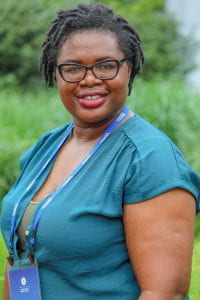We’ve ended the week still having not had a definition of social entrepreneurship. To be honest, having a definition hasn’t been important to us; what has been important is knowing that social entrepreneurship belongs to that big pool of change-making activities.
Outside the social entrepreneurship brain-racking, we had a couple of site visits to various organizations such as the Christiana Cultural Arts Centre, Creative Vision Factory, Rodel Charitable Foundation, YWCA Home-Life Centre and A.I DuPont Nemours Children’s Hospital. All site visits were met with a variety of emotions, learning experiences and definitely amazing opportunities for future collaboration.
We then had Ngozi Bell. One of the things that stood out in her session was her stressing the importance of building a legacy. In her words, “If you don’t have a legacy, you can never have success.” To have that success, we, as young leaders, especially in Africa, need to put the right people into the right job and incentivize them. Only then will we be successful because “success requires a collective.” The impact of legacy-creation was made very real to us when we visited the Reginald F. Lewis African-American Museum in Baltimore.
From Erastus Mong’are, Executive Director of StartUpAfrica, we have these great affirmations to live by:
“I am the voice, I will lead not follow.”
“I will create not destroy.”
“I am a leader.”
“I am a force for good.”
“I am a force for peace.”
“Defying the odds, Set a new standard.”
“STEP UP, STEP UP, STEP UP!”
Throughout the week, the common idea that stood out was ‘Do not give up’. For this to happen, we need a vision and Ngozi Bell took us through a great exercise in crafting what our vision is about. Taking us from 20 words to 10 words then 5 words, she asked us to write down what we are about as social entrepreneurs.
Here are some of our answers:
- Creating powerful African literary ecosystems
- Saving lives through Digital technology
- Empowering students on SRHR
- Ensuring that mental health matters
- Proud farmer and women’s rights activist
An action packed week but definitely a fulfilling one. Let’s see what next week has to offer.



 |
Pearl Phelendaba Chunga has over five years of experience in community engagement. She focuses on mental health awareness and is the founder of the Walk with Me Foundation, a mental health awareness non-profit organization. She also runs her own business as an event planner. Pearl grew up surrounded by addiction, and she suffers from anxiety and depression. Access to appropriate health services continues to be a problem in Zambia; Pearl is passionate about breaking the stigma surrounding mental illness. Upon completion of the Mandela Washington Fellowship, Pearl will continue to expand her work in the mental health field and envisions a Zambia where those that suffer from mental health problems are able to speak freely about their struggles. |
 |
Sènou Samson Francis Degbegni has over seven years of experience in community development and currently works as a Peer Educator on reproductive health. Sènou holds a bachelor’s degree in Agronomic Sciences from the Catholic University of West-Africa, and a master’s degree in Local Development and Decentralization from the African University of Cooperative Development. To address the high teenage pregnancy rates within Benin, Sènou is currently working to implement a digital education platform around sexual and reproductive health. Digital Health Services strives to provide youth with reliable, permanent, and accessible online sexual health resources. Currently, Sènou also volunteers with the National Students Association for Sexual Health and specifically focuses on sexual health for youth. Upon completion of the Mandela Washington Fellowship, Sènou wants to continue to educate youth in Benin around their sexual and reproductive health, while encouraging conversations between parents and children around sexual health through his digital platform. |
 |
Edwige Dro is a writer, literary translator and literary activist from Cote d’Ivoire. She is currently writing the fictionalized biography of Marie Kore, one of the female political activists of colonial Cote d’Ivoire through the support of a grant from the Miles Morland Foundation. She is the co-founder of Abidjan Lit, a collective of literary activists in Abidjan working on changing the “Africans don’t read” stereotype. Her short stories have been published in anthologies such as New Daughters of Africa or by publications such as Ankara Press or Bloomsbury. As an Africa39 writer in 2014, she was hailed as one of “the most promising writers under the age of 40 with the potential and talent to define trends in the development of literature from Sub-Saharan Africa and the diaspora” by the Hay Festival. Upon completion of the Mandela Washington Fellowship, she plans to continue her literary activism with a focus on nurturing the young literary voices of her country. |
 |
Christie Linonge Etombi is committed to improving cardiovascular health in Cameroon through health education and digital health technology. Currently, she is a medical doctor with Doctors Without Borders (MSF) Cameroon, where she works to ensure proper referral and management of internally displaced persons in the south-west region. She is a web and media coordinator of the Health Education and Research Organization (HERO) Cameroon, a non-governmental organization that seeks to safeguard a more equitable, disease-free, and emerging Cameroon. Through HERO Cameroon, she has organized various campaigns on cardiovascular disease prevention. She is also the Project Manager of m-thypa, a digital health technology platform to aims to reduce high blood pressure in Cameroon. Upon completion of the Mandela Washington Fellowship, she intends to use the m-thypa platform to provide low-cost prevention of high blood pressure and heart disease to more people. |
 |
Makhosi Exinia “Lineo Matlakala” Ntsalong works full time as the director of an agricultural organization in Leribe, which provides agri-business management skills to youth. She is the founder of the Barali Foundation, an organization that advocates for the rights of women and girls in rural Lesotho. |










